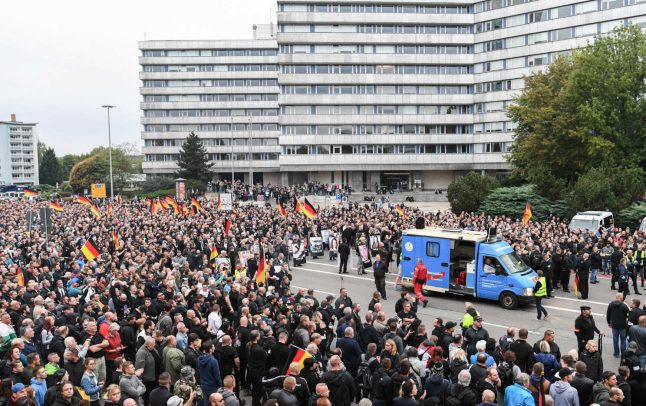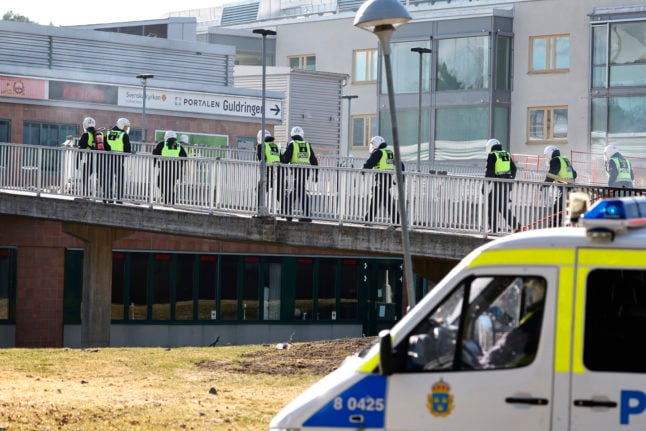The Center for Political Beauty (Zentrum für Politische Schönheit or ZPS) has published online pictures of people's faces who the group says took part in anti-foreigner rallies in Chemnitz, Saxony, at the end of August and in September.
Under the slogan: “Wanted: Where do these idiots work?” the group, known as ZPS, says it will hand out cash rewards for anyone who reveals information to them, such as names and employers.
In a statement on the website Soko-Chemnitz.de, which was launched on Monday, the group said it had evaluated 3 million pictures of 7,000 “suspects”.
Following the fatal stabbing of a man in Chemnitz allegedly by asylum seekers on August 26th, far-right protests erupted in the eastern German city. Some protesters gave illegal Nazi salutes, while videos emerged of others chasing people who they perceived to look foreign.
Chancellor Angela Merkel condemned the “Hetzjagd” or hunting down of foreigners. But a government crisis was sparked when the former head of Germany's domestic intelligence agency said there was no concrete evidence of this behaviour.
SEE ALSO: Merkel defends refugee decision in protest-hit Chemnitz
'Denounce your work colleagues'
ZPS said its goal was “to systematically record right-wing extremism in 2018, identify it and render it harmless”.
“Denounce your work colleagues, neighbours or acquaintances today and collect immediate cash,” the group added.
“Help us to remove the corresponding problem Germans from the economy and public services.”
On the website, photos of men and women's faces have been placed on the page with the dates that they allegedly protested.
Buttons have been posted below photos asking users to report people to their boss.
In further explanation the group said they aimed to “give a face to evil”.
“We want to lift right-wing extremism out of anonymity in Germany,” they added.
They said they wanted to assist law enforcers to solve crimes as they search for the names “of those who called ‘foreigners out’”
The group analyzed pictures and searched social networks to find the pictures and information for the project. They said photos were publicly sourced. The site has reportedly received around 2,000 leads from the public so far.
SEE ALSO: 'We aren't all Nazis': Chemnitz on edge after anti-migrant violence
'Time for denazification'
Speaking to reporters in Berlin on Monday, Phillip Ruch founder of the center, reportedly said that Chemnitz is “cosmopolitan” and “intercultural” and that the online portal would ultimately help show this.
He said it was “time for the denazification” of Germany.
However, concerns have been raised about the privacy of those alleged to have taken part in the Chemnitz protests as well as if there is any violation of art copyright laws. Berlin's data protection commissioner told regional newspaper Freie Presse that he was looking into the site and project.
Chemnitz police also told the newspaper that they had received a criminal complaint against the group on Monday.
The campaign has spilled out into real life too – a shopfront in Chemnitz has been covered with posters of 18 of the still unknown demonstrators.
On Tuesday Zeit Online questioned if the action was legal. They said the project was “probably illegal in two respects”.
The newspaper went on to say the artists' collective had “collected and analyzed data about third parties without any legitimate interest”, and that could violate data protection laws.
“And it is in the process of passing this data on to the employers of the people being evaluated,” the newspaper continued, saying that could prompt people who've been reported to their bosses to sue the group.
It's fair to say that ZPS is no stranger to controversy.
In January 2017, the group unveiled 24 concrete blocks directly in front of the Thuringian estate of the AfD's Björn Höcke – in the style of the Berlin Holocaust Memorial. It came after the politician had called it a “monument of shame” and said Germany should stop atoning for Nazi guilt.
“The new action is more virtual in appearance, but its desired effect is directly felt by far more people,” reported Spiegel on Monday.
 The previous artwork by the centre. Photo: DPA
The previous artwork by the centre. Photo: DPA
The project comes at a time when German police are reportedly looking for nearly 500 far-right extremists.
The Osnabrücker Zeitung reported Tuesday that, nationwide, 467 right-wing extremists are wanted by authorities.



 Please whitelist us to continue reading.
Please whitelist us to continue reading.
Member comments